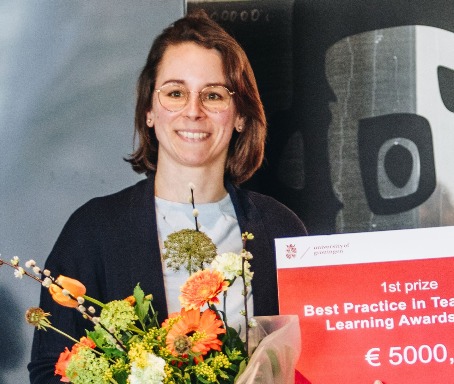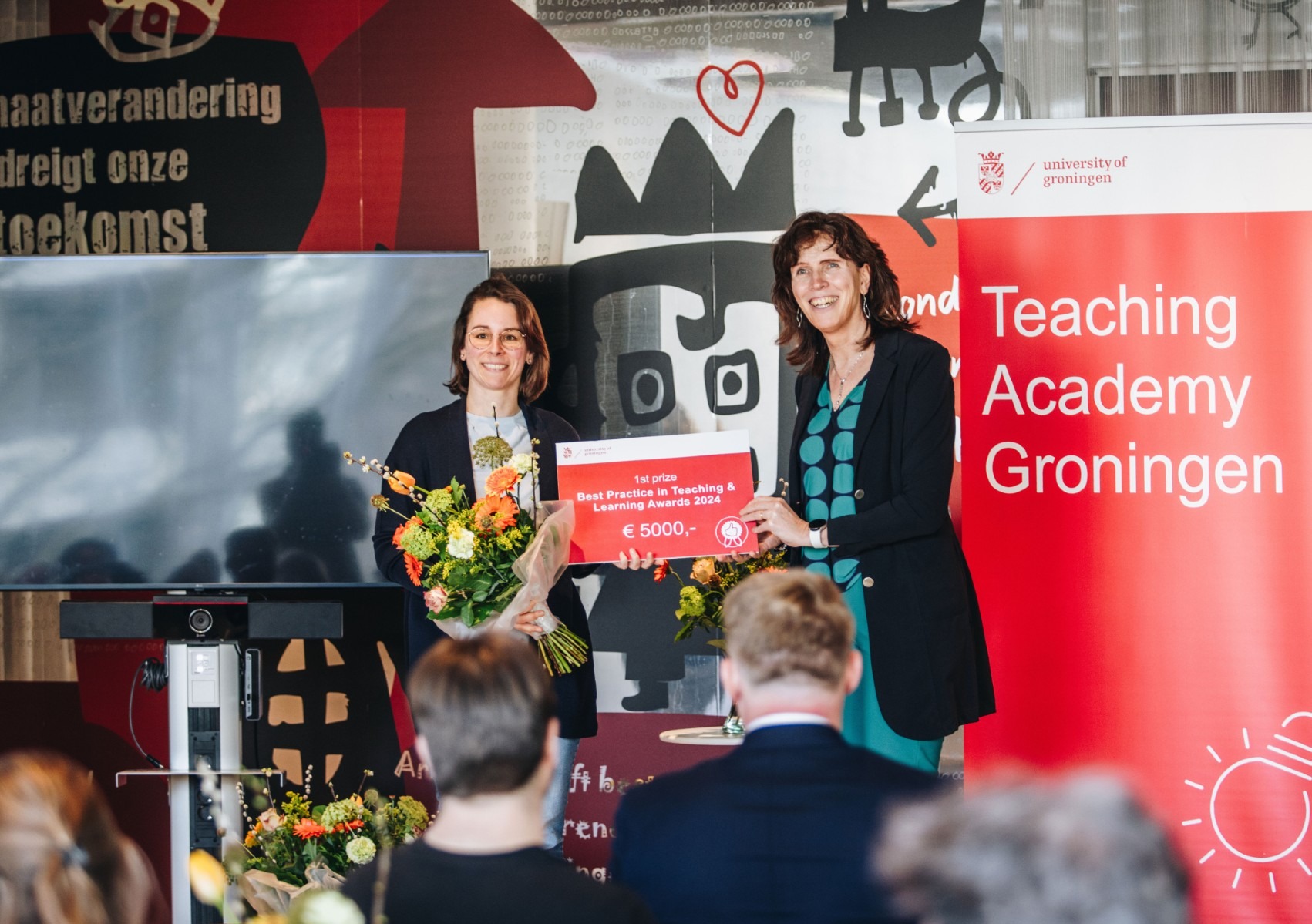Kirsten van den Bosch: ‘Studenten verbinden met de praktijk is echt in elke opleiding haalbaar’

Middels het vak Academic Learning Communities worden studenten in contact gebracht met organisaties om samen actuele problemen op te lossen. Met dit initiatief wonnen dr. Kirsten van den Bosch en haar team de Best Practice Award van 2024. De inzending overtuigde de jury omdat het een mooie combinatie is van theorie en praktijk. De studenten zijn erg blij met het programma omdat ze al vroeg in hun opleiding met actuele vraagstukken aan de slag kunnen, iets wat zij als zeer waardevol ervaren.
Verbaasd het je dat jij en je team hebben gewonnen?
Ja, absoluut! Als onderwijsteam zijn we voortdurend bezig om onze studenten de beste leerervaring te bieden. We waren helemaal niet bezig met eventuele prijzen die er te winnen zijn.
Hoe belangrijk is het winnen van deze prijs?
Genomineerd worden door de Onderwijscommissie, die voor een groot deel uit studenten bestaat, is een van de grootste complimenten die we hadden kunnen krijgen. Het gaf erg veel voldoening om hun verslag te lezen en te zien hoe onze onderwijsstrategieën en beoogde leerervaringen door de studenten zelf werden ontvangen. In dit vak geven we namelijk geen cijfers. Het draait allemaal om het ontwikkelen van een kritische onderzoekshouding bij de studenten en er zijn verschillende manieren om dat doel te bereiken. Als docenten kunnen we dus niet simpelweg naar tentamenscores kijken om te peilen in hoeverre we onze leerdoelen hebben bereikt. Daarvoor moeten we het vooral hebben van de ervaringen van studenten en hun reflectieopdrachten. En nu zijn zij juist degenen die ons vertellen dat we het goed doen! Dat de jury van de Best Practice Award dit ook nog eens bevestigt, nog wel op universitair niveau, sterkt ons vertrouwen in kleinschalige, studentgerichte actieve leeractiviteiten.
Hoe zijn jullie op het idee gekomen van deze Best Practice?
Om deze vraag te kunnen beantwoorden, moet ik wat meer context geven. Tien jaar geleden sloot het PedOn-programma niet goed aan bij de toenmalige onderwijsvisie en de strategische plannen van de faculteit en de universiteit. Daarin werd gesproken over activerend en onderzoeksgedreven onderwijs en het ontwikkelen van een kritische onderzoekshouding bij onze studenten. Daarom werd in het schooljaar 2014-2015 het vak Academic Learning Communities (ALC) geïntroduceerd. Binnen het vak werken studenten in kleine groepen van ongeveer vier tot vijf studenten aan onderzoeksgedreven opdrachten, waarin ze de kennis uit andere vakken van de opleiding moeten combineren en toepassen.
In het eerste jaar zijn er vier kleinere opdrachten die één deel van de onderzoekscyclus behandelen. Het tweede jaar was in eerste instantie een herhaling van zetten, maar drie jaar geleden zagen we een kans om studenten en professionals aan elkaar te koppelen. Toen kwamen we op het idee van de huidige opzet waarin professionals actuele problemen aandragen waar ze binnen hun organisatie mee te maken hebben. Studenten moeten op basis daarvan een onderzoeksplan ontwikkelen en uitvoeren om deze problemen te bestuderen. De wetenschappelijke resultaten moeten worden gepresenteerd op een symposium, maar ook worden omgezet in iets bruikbaars voor de professionals, zoals een brochure, een podcast of een spel. Door de theorie in praktijk te brengen, worden studenten beter voorbereid op een baan terwijl ze tegelijkertijd aan onderzoeksopdrachten werken.

Wat vinden studenten ervan?
Nou, kennelijk vinden ze het leuk! We krijgen meestal positieve feedback van hen, waarin ze zeggen dat ze de samenwerking met de professionals enorm waarderen. Sommige studenten vinden het best een uitdagingaan het begin, maar uiteindelijk krijgen ze het gevoel dat ze iets kunnen en dat ze worden gewaardeerd omdat ze met hun academische kennis en vaardigheden een bijdrage kunnen leveren aan de samenleving. Verder kan de hoeveelheid vrijheid die studenten hebben in het maken van hun eigen keuzes soms moeilijk voor ze zijn, omdat we ze niet vertellen hoe ze een specifiek probleem moeten oplossen. In plaats daarvan helpen we ze de juiste antwoorden te vinden. Dit is dan ook een van de meest gewaardeerde aspecten van het vak, omdat we daarmee laten zien als docenten en professionals dat we vertrouwen hebben in hun capaciteiten. Dat alles draagt bij aan hun intrinsieke motivatie, die hard nodig is voor een project dat een heel semester in beslag neemt.
Is dit iets dat in de toekomst universiteitsbreed kan worden toegepast?
Uitdagend of onderzoekend leren en studenten in contact brengen met de praktijk is in elke opleiding haalbaar. Natuurlijk zal de praktische uitvoering ervan verschillen, maar studenten laten werken aan problemen uit de echte wereld vanuit een academisch perspectief zal hun intrinsieke motivatie vergroten en zal hen helpen om te leren hoe ze de kennis die ze binnen de muren van de universiteit opdoen, kunnen toepassen in andere contexten. Als docent kun je dit doen met of zonder de medewerking van professionals en met individuele of grote groepen studenten. Zorg er in ieder geval voor dat je je studenten een zekere mate van vrijheid geeft; dit zal hun verantwoordelijkheidsgevoel vergroten. Vertel je studenten niet alleen hoe iets werkt of gedaan moet worden, maar creëer een mogelijkheid voor ze om jou te laten zien dat ze die kennis ook echt op een zinvolle manier kunnen toepassen.
Meer nieuws
-
17 februari 2026
Van ghostbuster tot rampenonderzoeker
-
03 februari 2026
‘Daar zit een goeie kop op’
-
20 januari 2026
Alcohol, appen en e-bikes
